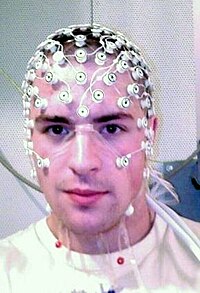
Training the attentional blink: subclinical depression decreases learning potential.
Sign Up to like & getrecommendations! Published in 2021 at "Psychological research"
DOI: 10.1007/s00426-021-01603-5
Abstract: The attentional blink (AB) reflects a temporal restriction of selective attention and is generally regarded as a very robust phenomenon. However, previous studies have found large individual differences in AB performance, and under some training… read more here.
Keywords: depression; task; time; attentional blink ... See more keywords

Mindful non-reactivity is associated with improved accuracy in attentional blink testing: A randomized controlled trial
Sign Up to like & getrecommendations! Published in 2021 at "Current Psychology"
DOI: 10.1007/s12144-021-01377-4
Abstract: Practitioners with years of mindfulness training (MT) have a reduced attentional blink (AB), relative to novices and non-practitioners. There is still a lack of evidence regarding the impact of relatively short-term intensive traditional MT on… read more here.
Keywords: attentional blink; group; improved accuracy; non reactivity ... See more keywords

Emotional induced attentional blink in obsessive-compulsive disorder.
Sign Up to like & getrecommendations! Published in 2021 at "Journal of affective disorders"
DOI: 10.1016/j.jad.2020.12.204
Abstract: BACKGROUND Although an attentional bias for threat is implicated in anxiety disorders, such a bias has not been consistently observed in obsessive-compulsive disorder (OCD). This inconsistency is partially due to a paucity of studies employing… read more here.
Keywords: compulsive disorder; obsessive compulsive; emotionally arousing; attentional blink ... See more keywords
Neural dynamics of the attentional blink revealed by encoding orientation selectivity during rapid visual presentation
Sign Up to like & getrecommendations! Published in 2020 at "Nature Communications"
DOI: 10.1038/s41467-019-14107-z
Abstract: The human brain is inherently limited in the information it can make consciously accessible. When people monitor a rapid stream of visual items for two targets, they typically fail to see the second target if… read more here.
Keywords: blink; blink revealed; neural dynamics; dynamics attentional ... See more keywords

Adults blink more deeply: a comparative study of the attentional blink across different age groups.
Sign Up to like & getrecommendations! Published in 2018 at "Developmental science"
DOI: 10.1111/desc.12512
Abstract: The attentional blink (AB) is thought to help the visual system parse and categorize rapidly changing information by segmenting it into temporal chunks, and is elicited using Rapid Serial Visual Presentation. It is reflected in… read more here.
Keywords: deeply comparative; blink; comparative study; adults blink ... See more keywords

A Skill‐Based Approach to Modeling the Attentional Blink
Sign Up to like & getrecommendations! Published in 2020 at "Topics in Cognitive Science"
DOI: 10.1111/tops.12514
Abstract: Abstract People can often learn new tasks quickly. This is hard to explain with cognitive models because they either need extensive task‐specific knowledge or a long training session. In this article, we try to solve… read more here.
Keywords: skill based; blink; attentional blink; approach modeling ... See more keywords

Categorical similarity modulates temporal integration in the attentional blink
Sign Up to like & getrecommendations! Published in 2020 at "Journal of Vision"
DOI: 10.1167/jov.20.4.9
Abstract: Attentional blink (AB) speaks to a phenomenon that, when reporting two targets in a rapid serial visual presentation, the second target (T2) is often missed if it followed the first target (T1) within an interval… read more here.
Keywords: temporal integration; attentional blink; categorical similarity; integration ... See more keywords

Gatecrashing the visual cocktail party: How visual and semantic similarity modulate the own name benefit in the attentional blink
Sign Up to like & getrecommendations! Published in 2019 at "Quarterly Journal of Experimental Psychology"
DOI: 10.1177/1747021818778694
Abstract: The “visual cocktail party effect” refers to superior report of a participant’s own name, under conditions of inattention. An early selection account suggests this advantage stems from enhanced visual processing. A late selection account suggests… read more here.
Keywords: cocktail party; name; attentional blink; visual cocktail ... See more keywords

EXPRESS: T1 difficulty does not modulate the magnitude of the attentional blink.
Sign Up to like & getrecommendations! Published in 2021 at "Quarterly journal of experimental psychology"
DOI: 10.1177/17470218211054750
Abstract: When the visual system is busy processing one stimulus it has problems processing a subsequent stimulus if it arrives soon after the first. Laboratory studies of this second-stimulus impairment - known as ¬attentional blink (AB)… read more here.
Keywords: difficulty; difficulty modulate; attentional blink; express difficulty ... See more keywords

A simple model of the attentional blink and its modulation by mental training
Sign Up to like & getrecommendations! Published in 2022 at "PLoS Computational Biology"
DOI: 10.1371/journal.pcbi.1010398
Abstract: The attentional blink (AB) effect is the reduced probability of reporting a second target (T2) that appears shortly after a first one (T1) within a rapidly presented sequence of distractors. The AB effect has been… read more here.
Keywords: mental training; model attentional; attentional blink;

Testing the skill-based approach: Consolidation strategy impacts attentional blink performance
Sign Up to like & getrecommendations! Published in 2022 at "PLoS ONE"
DOI: 10.1371/journal.pone.0262350
Abstract: Humans can learn simple new tasks very quickly. This ability suggests that people can reuse previously learned procedural knowledge when it applies to a new context. We have proposed a modeling approach based on this… read more here.
Keywords: consolidation strategy; based approach; skill based; approach ... See more keywords